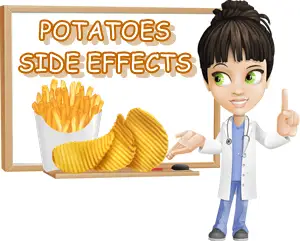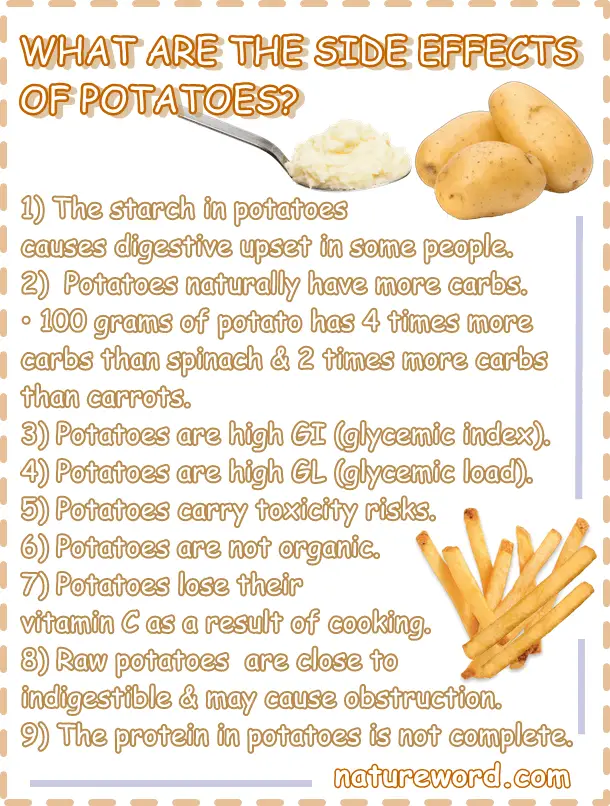Have you ever wondered what the side effects of eating potatoes are? Potatoes, like most, if not all other foods, come with a set of benefits and a set of side effects.
Fortunately, the benefits greatly outnumber the side effects. But this doesn’t mean that potatoes can’t be bad for you. On the contrary, the tubers are not always perfectly safe to eat.
Despite being generally very safe to eat, safer even than most nuts and seeds which are superior foods nutrition-wise, potatoes are not 100% devoid of side effects.
The health risks you may incur eating potatoes are generally few and self-resolving, provided potatoes are consumed in normal food amounts and not raw.
Nevertheless, there are instances when potatoes are bad for you.
Read on to discover the side effects of eating potatoes you may not have known about!

1- Potatoes may cause indigestion and stomach upset
Eating potatoes can be a source of digestive upset for some people. Indigestion with symptoms such as loose stools, painful abdominal cramps, bloating due to excess air in the GI tract, excessive burping and gas can occur following consumption of the tuberous vegetable.
The symptoms are generally mild and self-resolving.
Because some people are more sensitive than others, they may experience these types of side effects more frequently in response to potato consumption. Sometimes it’s particular varieties of potato that cause digestive upset and sometimes it’s a particular lot of tubers.
The causes for digestive upset after eating potatoes may include:
- An adverse reaction to the starch in the potato – potatoes with a mealy texture, also called floury potatoes, tend to have significantly more starch vs waxy potatoes.
- An adverse reaction to the intake of dietary fiber from the tubers, especially when the potatoes are consumed with skin. Find out if potato skin is bad for you.
- A symptom of toxicity caused by the presence of higher than normal amounts of toxic glycoalkaloids such as solanine and chaconine.
- An adverse reaction to pesticides – some lots may contain levels of pesticides above the permitted threshold.

2- Potatoes raise blood sugar levels
Potatoes are a plant food and, like all plant foods, they have carbs. But compared to other vegetables, potatoes have significantly more carbs. For instance, potatoes have roughly 4 times more carbs than spinach and turnip and two times the carb content of celeriac and carrots.
Digestible carbs from food get broken down during digestion into their simplest forms called simple carbs. Simple carbs are sugars.
And like all other nutrients, they get absorbed into the bloodstream to provide nutrition. Potatoes having more carbs means they raise blood sugar levels more than other foods.
Of course, this is not a reason to avoid them as they are a source of good nutrition. Even potato skin contributes to daily nutritional values measurably.
However, while eating potatoes won’t make you a diabetic, if you already are diabetic and have poor blood sugar control, then it becomes important to regulate your intake to avoid spikes in blood sugar.
Also see the nutrition of potato skin for 100 grams, with percentages of daily values.
3- Potatoes are a high GI food
The glycemic index for cooked potatoes is 76 to 90, the range in their GI score being explained by the differences in nutritional profile between the different varieties of the tubers.
The glycemic index measures how much a food raises blood sugar levels and potatoes score a high GI.
What this means is that potatoes raise blood sugar levels more than other foods.
Because of this, the recommendation is that they be consumed less frequently, or at least not every day.
This recommendation is principally aimed at individuals with existing metabolic disease that have a difficult time keeping their blood sugar under control. Eating potatoes is bad for them because potatoes will spike their blood sugar.
Learn more about what is the glycemic index and what it means for diabetics and nondiabetics alike, how foods are graded on the glycemic index scale and how the glycemic index of foods is determined.
4- Potatoes are a high GL food
The glycemic load for potatoes ranges from 13 to 26 for a serving of 100 grams.
This is a moderate to high GL score which indicates that potatoes raise blood sugar levels even when consumed in limited amounts. What this means is that eating potatoes is bad for you if you have high blood sugar.
While this does not mean you need to exclude potatoes from you diet, it means that you do have to be careful how much you eat to avoid spikes in your blood sugar levels.
At the same time, while potatoes are bad for high blood sugar and diabetes, you never eat just potatoes, so the glycemic load should not be considered by itself.
You should rather consider the glycemic impact of the complete meal.
For example, frying potatoes, eating them with a source of fat such as butter or mayo, nuts or seeds or vegetables such as spinach lowers the glycemic impact of the meal and, by extension, also the effects on blood sugar.
See also : Can Potatoes Cause Constipation?
5- Potatoes carry toxicity risks
The potato plant naturally produces and accumulates toxic pesticide-like constituents called glycoalkaloids. Different parts of the plant accumulate varying amounts of toxins.
Tubers of the cultivated potato only have minute amounts of glycoalkaloids, generally insufficient to produce toxicity symptoms.
The flesh has the absolute lowest content of glycoalkaloids of all plant parts, hence the reason why potatoes are generally very safe to eat.
However, some cultivars of potato and tubers that have been stored improperly can, on rare occasions, accumulate more toxins.
If this is the case, marked side effects indicative of a toxicity reaction occur.
Symptoms primarily include digestive upset that is moderate to severe, neurologic and cardiac side effects.
Signs and symptoms of toxicity from potatoes include nausea, vomiting, stomach cramps and general stomach upset, loose stools and diarrhea, as well as headaches, arrhythmia and side effects affecting the nervous system.
Death is possible, although not from consuming potatoes in normal food amounts.
6- Potatoes are not organic and may contain high levels of pesticides
Potatoes from commercial production are usually never organic in the true sense of the word.
An organic food should ideally have no pesticides used on it, or amounts way below the legal threshold, but that is virtually impossible with potatoes.
Cultivating potatoes on a commercial scale requires the use of pesticides to ensure a good enough crop to make a profit.
Not just this, but agricultural land is usually laden with pesticides from years of intensive cultivation of various produce which then exposes future crops to pesticides as well since large pieces of land used for growing food are not allowed to rest and regenerate for the needed amount of time to clear out pesticides.
7- Potatoes lose their vitamin C following cooking
Potatoes provide more than decent nutrition and one of the most mentioned nutritional facts is their vitamin C content.
A serving of just 100 grams of potato can get the average adult close to 22% of all the vitamin C they need for a day. Which is a lot!
But, and this is a big but, potatoes are never eaten raw and regular cooking which involves use of heat destroys their vitamin C completely, or almost.
So the fact that they are a good source of vitamin C ultimately does not mean anything.
8- Raw potato skin and flesh are close to indigestible
Some foods you can eat raw and some you can’t, and really shouldn’t either. Potatoes are one.
The tubers have edible flesh and skin, but while edible, they are only meant to be consumed cooked. Potato flesh and skin have really tough fiber which renders them close to indigestible.
Eating raw potatoes at best causes indigestion; symptoms may include stomach hurt (e.g. a dull stomach pain), painful cramps, an irritated stomach, excessive burping, bloating, loose stools and a general feeling of physical unwell.
In the worst of cases, eating raw potatoes can lead to bowel obstruction.
9- The protein in potatoes is not complete
Of course nobody eats potatoes for their protein content which is low anyway (potatoes have under 3 grams of protein per 100 grams).
Nevertheless, it’s important to point out that potatoes are not a complete protein. That is, while they do provide protein which contains a range of amino acids, both essential and non-essential, they don’t provide all essential amino acids which the body absolutely needs.
To get excellent amounts of protein, and also complete protein with all essential amino acids, you can opt for eggs, whether chicken, duck eggs, goose or other varieties.
There is good protein in both egg white and egg yolk so you won’t be missing out if you choose to eat just the egg white instead of the whole egg.
See how much of your daily nutrition you get from eating just one duck egg. Also see what is the nutrition of one egg white and what is the nutrition of one egg yolk, complete with percentages of daily values of essential vitamins and minerals.
